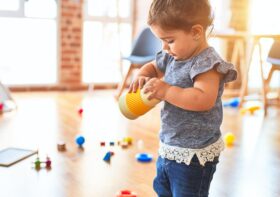Healing and Parenting: How Unresolved Trauma Is Sabotaging Parenting

Hey mama, let’s talk about something real for a sec. As moms, we all have our struggles. And if you’re a survivor of trauma, you know that parenting can be particularly challenging in certain circumstances. But the thing is, you’re not alone. And there’s hope. In this post, we’re gonna break down how unresolved trauma affects parenting, and how we can begin to heal. So sit back, grab a cup of tea, and let’s dive in.
Table of Contents
ToggleUnderstanding the Impact of Unresolved Trauma on Parenting
Trauma is a part of life. And as moms, we all have our own unique stories and experiences. For me, I’m a survivor of child trafficking and domestic abuse. And trust me, it’s been a journey. But through it all, I’ve learned that healing is possible. And as a parent, I know that unresolved trauma can impact our ability to parent. So in this post, we’re going to dive into the neuroscience of trauma, and how it affects our brains. We’ll also talk about the connection between trauma and parenting, and how to recognize the symptoms of trauma in ourselves and our children. But most importantly, we’re gonna talk about healing. Because as moms, we deserve to heal, and to give our children the best possible chance to heal too.
The Neuroscience of Trauma: How Unresolved Trauma Affects the Brain
So let’s talk brain science. When we experience trauma, our brains go into survival mode. The primitive areas of the brain, such as the amygdala and the hippocampus, take over. This is why we experience things like hypervigilance and flashbacks. But when we don’t heal from the trauma, these primitive areas of the brain stay activated. And that’s when things get tricky. Because when the primitive areas of the brain are activated, it can affect our ability to think, feel, and even parent. It’s like our brain is stuck in survival mode, and can’t move forward. But here’s the thing – healing is possible. And when we heal, we can help our brains to function in a healthier way.
My Journey as a Survivor of Child Trafficking and Domestic Abuse
As a survivor of child trafficking and domestic abuse, my journey has been anything but easy. I was exposed to so much violence and trauma that it’s hard to even put into words. And as an adult, I’ve had to learn how to navigate the aftermath of those experiences. But through it all, I’ve come to realize that my past doesn’t have to define me. And I’ve also come to realize that my experiences as a survivor have given me a unique perspective on parenting. Because I know what it’s like to feel alone and helpless. But I also know what it’s like to find hope and healing. And that’s why I’m sharing this with you today. Because as a mom, I want to empower you to find hope and healing too.
The Connection Between Trauma and Parenting: How Trauma Affects Our Ability to Parent
As a parent, it’s normal to want to protect our children from harm. But when we’re dealing with unresolved trauma, it can be hard to know how to do that. Because our own experiences of trauma can affect how we interact with our children. For example, if we’re dealing with hypervigilance, we might be overly protective of our children (definitely of that in the past). Or if we’re dealing with flashbacks, we might be triggered by certain things that our children do (On more than a few occasions, I’ve been ‘triggered’ by yelling in the house). And that can make parenting a real challenge. But here’s the thing – we’re not alone. And by understanding the connection between trauma and parenting, we can begin to make changes that will benefit our children and ourselves.
Understanding the Symptoms of Trauma: How to Recognize Trauma in Ourselves and Our Children
When it comes to recognizing the symptoms of trauma, it’s important to remember that everyone is different. But some common symptoms of trauma include things like flashbacks, disassociation, insomnia, lethargy, nightmares, headaches, mood swings, hopelessness, shock, social isolation and withdrawal. And as parents, it’s critical for us to recognize these symptoms in ourselves so that we can get the help we need. But it’s also essential for us to recognize these symptoms in our children. Because when our children are dealing with trauma, it can affect their ability to learn, to form relationships, and even to play. But by understanding the symptoms of trauma, we can begin to take steps to help both ourselves and our kiddos.
The Importance of Healing: How to Begin the Healing Process as a Parent
But where do we begin? One place to start is by finding a therapist who specializes in trauma. If you’re in the USA, finding an affordable therapist sounds like the beginning of the Hunger Games. But the odds are ever in your favor, tbh. Therapy doesn’t have to be expensive. There are many low-cost or sliding scale options available. There are also many organizations that are offering free sessions for certain demographics.
If you’re local to Colorado, Spark the Change provides free, short term counseling services to individuals, couples, and families who encounter barriers to accessing treatment. I Matter provides up to six free therapy sessions for Colorado youth ages 18 or younger or 21 or younger if receiving special education services. If you’re outside of Colorado or those options aren’t a good fit, another option is Bliss. It is an 8 session interactive online therapy program for depression that you complete on your own. The program is based on psychotherapy treatment, CBT. My best suggestion is to Google your city or local area name + free therapy, then sift through the results that aren’t ads. Another suggestion that can be helpful is to find a support group. It’s essential to know that we’re not alone. And by connecting with others who have been through similar experiences, we can learn from one another and find hope, strength, togetherness and healing.
Techniques for Coping with Trauma: Strategies for Managing Trauma and Parenting
A day in the life of a parent never ends, so having strategies up your sleeve for coping with trauma, helps to be prepared for whatever the day may bring. There are many different techniques that can be helpful. For example, mindfulness practices like deep breathing, meditation and yoga can be helpful for managing symptoms of trauma. And there are also techniques like grounding and self-care that can be helpful for managing triggers. As a mama with panic disorder, breath work has been a God-send! Practicing breathing sounds redundant, but without visualizing and going through the motions of how to react when a panic attack presents itself, I wouldn’t have learned how to reduce their length and severity. We must remember that it’s okay to take care of ourselves. Because when we take care of ourselves, we’re better able to take care of our children.
Empowering Ourselves as Trauma Survivors and Parents
As a mom, you deserve to heal. And as a trauma survivor, you have the strength and resilience to do so. By understanding the neuroscience of trauma, the connection between trauma and parenting, and the importance of healing, we can begin to empower ourselves and our children. And by finding support and utilizing techniques for coping, we can begin to navigate the journey of healing. You’re not alone, and healing is possible.
Resources for Healing and Support for Trauma Survivors and Parents
There are additional resources available to help you on your journey of healing. Check out the National Domestic Violence Hotline, the SAMHSA’s National Child Traumatic Stress Initiative, and the National Parent Helpline for more information and support. And if you’re looking for more information on the neuroscience of trauma, check out the book “The Body Keeps the Score” by Bessel van der Kolk. And please feel free to reach out to me, I am happy to help.
So there you have it, mama. The connection between unresolved trauma and parenting, and how to begin the healing process. Healing is possible, and you’re not alone. Keep fighting, keep healing and keep loving.




Thank you for sharing. I appreciate your effort in putting together a very much-needed article.
Thank you for taking the time to read, Blaise.